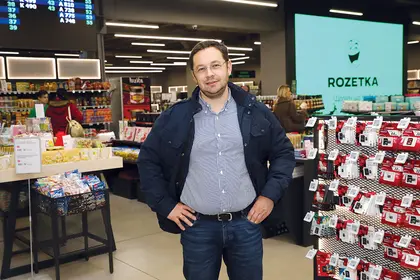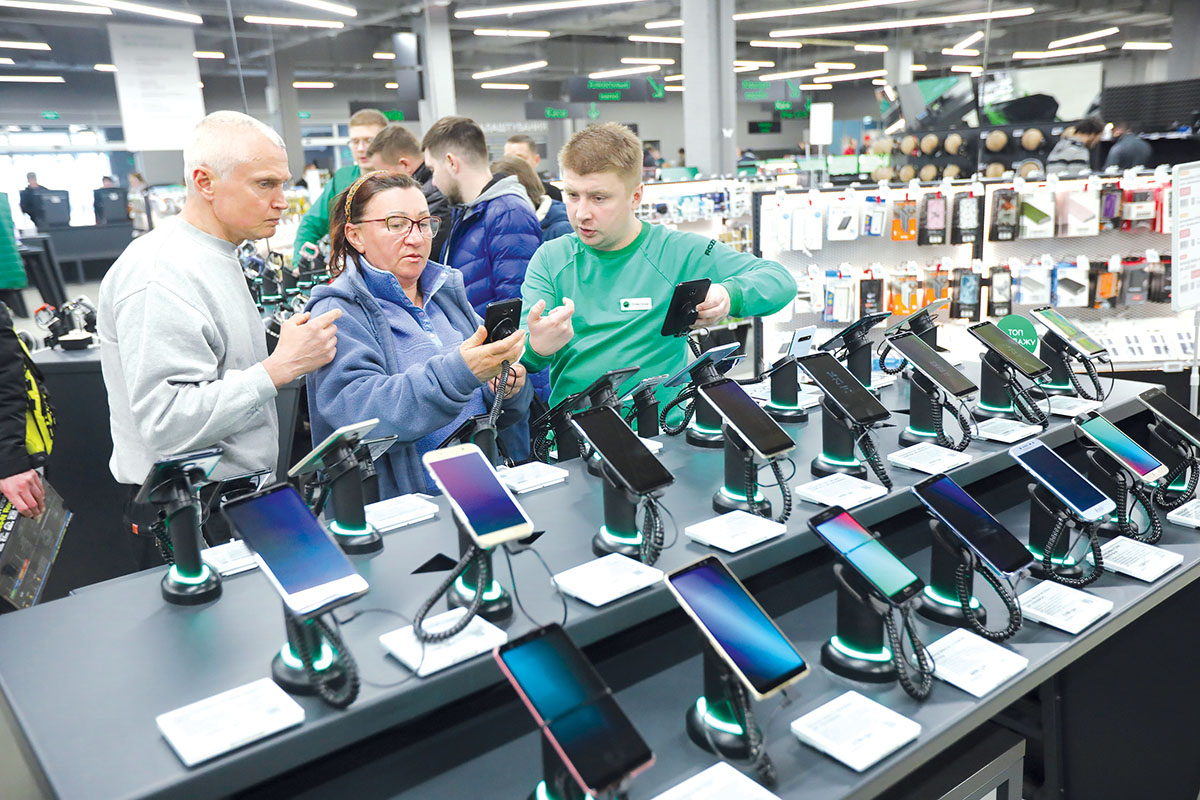The green smiley of e-commerce giant Rozetka is one of the most recognizable logos in Ukraine — every day millions of people visit its website, tens of thousands order through it every day.
And yet, notwithstanding the scale of its operations, Rozetka remains just a family business at its core.
JOIN US ON TELEGRAM
Follow our coverage of the war on the @Kyivpost_official.
There’s still only one person in Rozetka generating Rozetka’s news and countering criticism: its founder and chief executive — 40-year-old Vladyslav Chechotkin. And he doesn’t usually have a plan in regards to public relations, talking with critics, clients, and journalists — he just goes with his gut.
“I don’t have a strategy to create some kind of a picture for investors or for anyone else really. It comes naturally,” Chechotkin says in an interview with the Kyiv Post.
Apart from public relations, all major decisions in the firm are made by relying on his gut feeling. Critics say that this is a risky strategy, given that every step of this 4,000-employee giant has now a national impact.
Big size, big problems
“I’d rather pay more than waste my time and mental health (with Rozetka),” reads one of the hundreds of angry comments on otzyvua.net, the website that publishes people’s reviews on shops in Ukraine. The site has 6,000 reviews of Rozetka, 40 percent of which are “awful.”
Many commentators claim they leave feedback on various forums, because Rozetka filters feedback on its site, letting through only moderated ones. Chechotkin denies this, although he adds that that’s something he needs to check.
Chechotkin also thinks that criticism is disproportionately loud. Satisfied people just don’t say as much, he says: “One offended person speaks for 10, while one content person speaks for one.”
Positive comments are rare because it’s nothing special about fulfilling your promise as a retailer — to ship an item, he says. “There’s no need to be thanked for that.”
Another thing is the volume of sales. There is a certain proportion of “unmet promises,” and because of the sheer number of transactions, these people are numerous, and so “their voice is heard,” the executive says.
Chechotkin says Rozetka “makes efforts” to satisfy clients and “sooth the offended.” One of these efforts is a call center of 600 people, which “sucks up money,” he says. Even U. S. tech giant Amazon doesn’t have a call center, the Ukrainian entrepreneur points out.
Besides, client-shop relations work the other way round, too. There are people who cheat Rozetka, “exploiting the business,” Chechotkin claims.
Some order huge TV sets to watch just one football match with friends, and hand it back to Rozetka right after the game. Others “rent for free” expensive $2,000 dresses to go to proms.
Rozetka asks people why they are returning things and adds dishonest clients to the company’s internal blacklist, even though retailers are forbidden to have these in Ukraine. Globally, 30 percent of all purchases made online are returned, according to Invesp, a brands consulting firm. In Rozetka’s case, “it’s less.”
“And what shall we do to a man who has bought a TV set, dropped it at home and now blames us and asks for a reimbursement,” he said. “How do you solve such problems? Honestly, I have no idea.”
Online store goes offline
Many long-established physical stores dream of going online by creating a website or a mobile application. Rozetka, however, is doing it the other way around: founded as an online store in the first place, the company now aims to have brick-and-mortar stores as well.
One of its offline stores now works in the heart of Ukraine, on Maidan Nezalezhnosti. It costs the company a small fortune every month — Hr 1 million, or roughly $40,000 — in rent. The money goes to national postal operator Ukrposhta, as the rented space is part of their main post office.
“The place is narrow, there are columns inside; there is not enough electricity. We couldn’t do there what we wanted. But we didn’t have a better deal,” Chechotkin says, adding that it’s impossible to estimate the shop’s impact on overall company profits. “But even if unprofitable, it’s valuable for the company’s brand.”
Apart from this central one, Rozetka has four more stores in Kyiv and three in Odesa. Chechotkin plans to open at least one physical store in every big city in Ukraine, including ones in Lviv, Kharkiv, and Dnipro. In 2018, Chechotkin invested $10 million in opening brick-and-mortar stores.
No Apple products
Rozetka, the country’s biggest electronics retailer, doesn’t sell devices made by Apple, the famous U.S. gadget maker, directly. Why not? Chechotkin claims nearly 90 percent of Apple devices in Ukraine are “unofficial” and not taxed, and he doesn’t want to deal with illegal tech.
So Rozetka removed Apple gadgets like iPhones and MacBooks from its shelves around spring 2018.
Before that, Chechotkin had written letters to Apple, but they “don’t care whether iPhones are official or not in Ukraine, counterfeit or not,” he said.
And according to him, Rozetka doesn’t sell counterfeit goods. “That’s why the product range offered by our competitors might differ from ours.”
From autumn 2018, however, the retailer found a way to offer customers the chance to buy Apple products via the store by allowing certain “partners” to place their devices on the Rozetka website.
A partner, Chechotkin explains, must be a legal entity that takes on full responsibility for transactions with buyers; gadgets they sell must be original and not used before. The sellers bear responsibility for the electronics — Rozetka does not.
Restyling the old brand
Chechotkin and his wife Iryna, Rozetka’s co-founder who prefers to be less public than her husband, have been developing the brand since 2005. They built everything from scratch, including the green smiley logo.
And it worked. They have built a profitable company and even sold a minor share in it to investment firm Horizon Capital for an estimated $300–$700 million in 2015. Chechotkin’s fortune alone is estimated to be $165 million, making him the 29th richest person in Ukraine, accroding Ukraine weekly news magazine Novoye Vremya.
But Rozetka needed an update of its looks and internal operations, and a set of rules, instead of intuition. So in September 2018, they hired the well-known branding agency Fedoriv “as a critic from the side” to help them bring their corporate identity up to date.
The logo, fonts, colors have been already restyled, but “many nuances” of company internal processes are still being refined. Chechotkin wouldn’t say exactly what has changed, but said, “these are thousands of tiny details” concerning work with clients.
“There are things we don’t agree with (Fedoriv) on,” he adds, after a pause.
Consolidating
Rozetka is the fifth most popular website in Ukraine, according to research firm Kantar TNS. Only Wikipedia, Facebook, Google, and YouTube are higher in the ranking.
There was another marketplace that could have challenged Rozetka’s market share — Prom.ua, which currently holds seventh place in the ranking. But they have now ceased to be rivals, as Rozetka in late November bought a 56-percent stake in EVO Group, Prom.ua’s parent company.
Chechotkin would not disclose the price he paid for the share, but according to online tech journal AIN.ua, the value of the deal is around $12–15 million.
Both companies are hoping to complement each other, as Rozetka has a well-developed logistics chain stretching throughout Ukraine, while EVO has a number of smaller online stores, with Prom.ua being only the most prominent one.
Chechotkin said Rozetka needed EVO Group because it wanted to use its marketplace model — there are many products Rozetka doesn’t know how to store and doesn’t want to take “commercial risks on.” The entrepreneurs who sell such goods via Prom.ua take on these risks, the executive said.
Politics and money
Chechotkin says he doesn’t usually get involved in politics, but he couldn’t ignore the upcoming presidential election planned for March 31.
At the beginning of 2019, Dmytro Gnap, who quit journalism to become a politician, was crowdfunding $90,000 to pay a required registration fee to run for the presidential election in Ukraine. Chechotkin chipped in.
For him, that was the only convenient way to get involved: Gnap was crowdfunding money and “it was easy to pledge.”
Besides, Chechotkin knew Gnap, as he watched his journalistic investigations, and even took a part in some. “He impressed me,” Chechotkin said, adding that he knew Gnap would never win, but this election could mean his Nasha Ukraina party might have a better chance in the parliamentary elections in the fall.
After the crowdfunding, however, Gnap’s colleagues revealed the journalist didn’t donate almost 15,000 euros of newsroom money to the Ukrainian army as he had publicly promised to do. Chechotkin said Gnap had disappointed him.
“I’ve now understood that I was wrong, but it’s impossible to get my money back,” he said.
“Luckily, I didn’t give much.”
The Kyiv Post’s technology coverage is sponsored by Ciklum and NIX Solutions. The content is independent of the donors.
You can also highlight the text and press Ctrl + Enter





